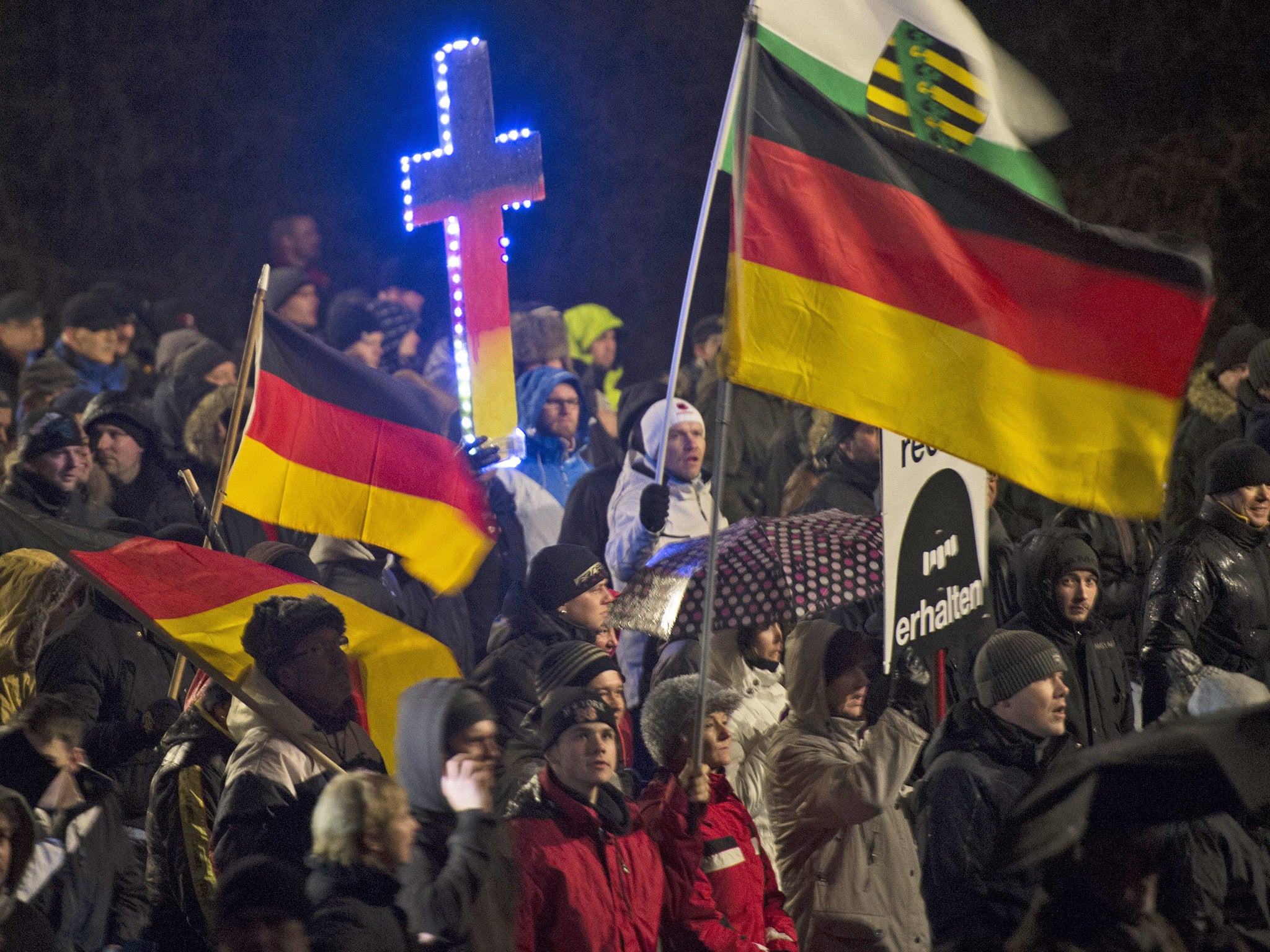Pegida protests: Germany's anti-Islamic movement sparks furious right-wing power struggle
Pegida's sudden popularity has caused deep divisions within the country's recently formed Eurosceptic and xenophobic AfD party

Your support helps us to tell the story
From reproductive rights to climate change to Big Tech, The Independent is on the ground when the story is developing. Whether it's investigating the financials of Elon Musk's pro-Trump PAC or producing our latest documentary, 'The A Word', which shines a light on the American women fighting for reproductive rights, we know how important it is to parse out the facts from the messaging.
At such a critical moment in US history, we need reporters on the ground. Your donation allows us to keep sending journalists to speak to both sides of the story.
The Independent is trusted by Americans across the entire political spectrum. And unlike many other quality news outlets, we choose not to lock Americans out of our reporting and analysis with paywalls. We believe quality journalism should be available to everyone, paid for by those who can afford it.
Your support makes all the difference.Germany’s growing anti-Islamic protest movement has ignited a furious leadership battle within the country’s new right-wing populist Alternative for Germany (AfD) party, prompting charges that the organisation is “tearing itself apart” less than two years after it was founded.
The AfD’s blistering internal dispute has coincided with fresh mass street protests by Germany’s anti-Islamic Pegida movement, which drew a record crowd of 18,000 supporters in Dresden on Monday night despite harsh criticism of its xenophobic aims by politicians and celebrities. There were similar but less well-attended protests by Pegida, which stands for “Patriotic Europeans against Islamisation of the West” in Berlin, Stuttgart and Cologne, where the Catholic Church switched off floodlights playing on the city’s famous cathedral in protest.
An estimated 30,000 Germans were reported to have staged anti-Pegida protests across the country on Monday. Today, 80 celebrities and leading political figures, including the 96-year-old former Social Democrat Chancellor Helmut Schmidt, launched an anti-Pegida campaign. “The movement appeals to hollow prejudice, xenophobia and intolerance,” Mr Schmidt said.
Pegida’s sudden popularity, which appeared to mushroom in early December, has shocked Germany’s established political parties. Chancellor Angela Merkel has condemned it outright. But the movement has caused deep divisions within the country’s recently formed Eurosceptic and xenophobic AfD, prompting a bitter fight between the party’s three co-leaders over its future political course.
The AfD, which was founded in 2013, won its first seats in European elections last spring with public opposition to the euro. It went on to make big and unexpected gains in key state autumn elections in East Germany where it secured up to 12 per cent of the vote with an anti-foreigner campaign that focused on tough border controls and repatriation for “criminal” immigrants. Pegida has since shifted the AfD further away from mere opposition to the euro and helped thrust the party towards the far right. Alexander Gauland, the AfD’s leader in the eastern state of Brandenburg recently attended a mass Pegida rally in Dresden and insisted that the movement’s members were his party’s “natural allies” and that the AfD had to “listen” to their concerns.
His views are echoed by Frauke Petry, the AfD’s leader in the eastern state of Saxony, who has scheduled a meeting with Pegida leaders in the state’s capital, Dredsen, on Wednesday in a gesture which has been taken as a clear sign of her solidarity with the movement. Ms Petry’s support for Pegida was given “intellectual” backing at the weekend by the right-wing journalist Konrad Adam, who along with Ms Petry is one of the three co-leaders of the AfD together with the party’s founder, the former economics professor Bernd Lucke.
Mr Adam, who in the past has accused Muslims of having an “aggressive special self-consciousness”, published a lengthy article in Germany’s Frankfurter Allgemeine Sonntagszeitung at the weekend on the eve on Monday’s mass Pegida protest. The article was entitled: “How the Christians defeated the Turks once before.” It gave an account of the battle of Lepanto in 1271.
But the AfD’s sudden lurch to the far right and its espousal of Pegida values has alarmed Mr Lucke, who demanded last week that his more xenophobic co-leaders should renounce their posts and allow him to lead and speak for the party on his own. Mr Lucke has said that it is legitimate to talk to protest movements like Pegida but he has ruled out the idea of joining forces with them. He is backed by the AfD’s deputy leader, the former German Federation of Industry boss, Hans-Olaf Henkel, who has warned his party against backing Pegida.
By contrast, Mr Adam, Mr Petry and Mr Gauland want the AfD to “open itself to people who fear being swamped by Islam”, according to an internal memo leaked to the media. In a furious letter addressed to Mr Lucke, they accused the party’s founder of behaving like “the lord of the manor” with his demand that they renounce their co-leadership posts. The dispute prompted Der Spiegel to ask whether the AfD was already “tearing itself apart”. Recent opinion polls have suggested that Pegida has not helped the AfD. Support for the party has dropped from around 10 to 5 per cent since last September.